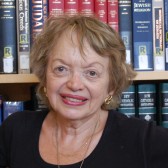
"The Holocaust in Heritage: Irene Némirovsky, Her Daughters, and the ‘Jewish Question’ in France"
Professional Background
Susan Rubin Suleiman is the C. Douglas Dillon Professor of the Civilization of France and Professor of comparative literature at Harvard University. She received a Ph.D. and an M.A. from Harvard University and a B.A. from Barnard College. For her J.B. and Maurice C. Shapiro Senior Scholar-in-Residence Fellowship, Dr. Suleiman conducted research for her project “The Holocaust in Heritage: Irene Némirovsky, Her Daughters, and the ‘Jewish Question’ in France.”
Professor Suleiman is the author of many books on modern literature and culture as well as autobiographical work and poetry. Her most recent book, Crises of Memory and the Second World War (Harvard University Press, 2006), examines the effect of World War II on writers who emerged from that traumatic experience. Her other works include the memoir, Budapest Diary: In Search of the Motherbook (University of Nebraska Press, 1996); Risking Who One Is: Encounters with Contemporary Art and Literature (Harvard University Press, 1994); Subversive Intent: Gender, Politics, and the Avant-Garde (Harvard University Press, 1990); and Authoritarian Fictions: The Ideological Novel as a Literary Genre (Columbia University Press, 1983). She has also edited or co-edited many works, including with Christie McDonald, French Global: A New Approach to Literary History (Columbia University Press, forthcoming); with Éva Forgács, Contemporary Jewish Writing in Hungary: An Anthology (University of Nebraska Press, 2003); and Exile and Creativity: Signposts, Travelers,Outsiders, Backward Glances (Duke University Press, 1998). She is currently collaborating with Jakob Lothe and James Phelan on After Testimony: The Aesthetics and Ethics of Holocaust Narrative for the Future. She is a member of the editorial boards of the scholarly journals Comparative Literature, Etudes Littéraires, and History and Memory.
Professor Suleiman has served as Chair of the Department of Literature and Comparative Literature and as Head of the French Section, Director of Graduate Studies in French, and Chair of the Department of Romance Languages and Literatures at Harvard University. She served as Vice-President and President of the American Comparative Literature Association and held several positions at the Modern Language Association (MLA). Professor Suleiman is the recipient of many awards, including fellowships at the Collegium Budapest Institute for Advanced Study, the Radcliffe Institute of Harvard University, and the Center for Advanced Study of the Norwegian Academy of Sciences. She was named a Walter Channing Cabot Fellow for distinguished achievement by Harvard University and held the Leverhulme Trust Visiting Professorship at the University of London. Her other fellowships include a Guggenheim Fellowship, a Rockefeller Foundation Humanities Fellowship, and a National Endowment for the Humanities Fellowship. She was decorated by the French government as an Officer of the Ordre des Palmes Académiques.
Fellowship Research
During her tenure at the Center, Professor Suleiman researched the life and work of Irène Némirovsky in relation to questions of Jewish identity in France before, during, and after the Holocaust. A well-known author in France before World War II, Némirovsky was deported to Auschwitz in 1942 and died there. Her work was forgotten for many years and was only revived starting in the 1990s, thanks to her daughters, who survived the war as hidden children. The younger daughter, Elisabeth Gille, wrote a creative biography of Némirovsky in the form of an imaginary memoir, as well as a novel about her own experiences as a child during the war. The older daughter, Denise Epstein-Dauplé, transcribed the manuscript of Suite Française, Némirovsky’s masterpiece that became an international bestseller sixty years after the author’s death. Professor Suleiman explored Némirovsky’s relationship with her own Jewishness—complex, ambivalent, and often troubled—and her daughters’ relationships to their deceased parents, especially their mother. Issues of identity, memory, and creativity will intersect to portray the rare combination of generations of writers in a single family of Holocaust victim and survivors. Professor Suleiman used the Museum’s extensive archival collection and library resources to complete her research.
Professor Suleiman was in residence at the Mandel Center from September 1, 2009 to May 30, 2010.
